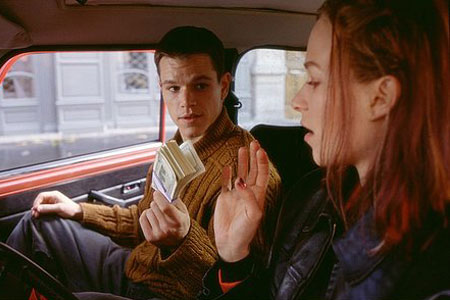Favorite screenplays: The Bourne Identity part 4
Bang! Act II of The Bourne Identity begins with a dizzying montage of activity. In CIA headquarters, Conklin’s sons bring up “the grid,” the international web of electronic checkpoints that can pinpoint just about anybody at any given time. (When people talk about being “off the grid,” that’s what they’re talking about — they cannot be traced through electronic channels.) Conklin wants Bourne dead: quite a bad father indeed. It’s one thing to be cold and distant, it’s something else again to want to kill your son. Worse, he’s decided to “wake up” all of Bourne’s fellow Treadstone assassins — in essence, his “blood brothers.” Conklin wants to set brother against brother. There are families where no one ever talks about anything, but Conklin is running a family where the brothers don’t even know each other’s names.
Meanwhile, Jason rides in a car with Marie, who jabbers about her disastrous personal life. She talks about herself, by her own reckoning, for over an hour, while Jason does nothing but stare off into space. And we see that they are, essentially, on a very awkward “first date.” She’s nervous, he’s shy, they like each other but there is palpable tension to the situation.
Back at CIA headquarters, Conklin tries to figure out why Bourne is acting so erratically. The script veers close to comedy, with the sophisticated boss who figures that the bumbling employee is actually a genius playing some kind of devious trick. The comedy is compounded when he gets introduced to Marie, whom he takes to be another super-assassin from some other program. Marie, who keeps her official papers in a wad in her purse and drives the smallest, ugliest car in Europe. At a CIA safe house in Paris, a young woman in a garrett sends out a wanted poster with Jason’s and Marie’s pictures on it.
Jason and Marie stop at a roadside diner. Jason tries to make sense of his predicament. He has, as Liam Neeson would later describe it, a particular set of skills. They confuse and terrify him, but Marie seems drawn to him. Despite the danger, Jason is, above all, supremely capable. And we sense that Marie has dated a long string of losers, all of whom were trouble, none of whom were capable. Jason is, even if he’s a dangerous super-assassin, a step up. As they drive into Paris, Jason sleeps and Marie watches over him — not only desirous, but even maternal. Jason is more than just an orphan in the storm, he’s a little boy lost. Women sometimes dream of a man they can mold to their liking, but few are presented with a veritable tabula rasa.
They arrive in Paris on a cold morning. Marie asks “Do you have family waiting for you?” underscoring the father-son conflict. Jason does, indeed, have family waiting for him, but not in the sense Marie is thinking. (Marie means either “Do you have parents?” or perhaps “Do you have a wife and children?” — probably the latter.)
They get to Jason’s apartment, which he’s never seen before. They have an awkward conversation on the doorstep — should Marie come up or not? — again, exactly like the same moment on a first date. Should Marie play it cool and never see Jason again, or should she ask to come up, since he seems to be dragging his feet on popping the question? Eventually, Marie says she’ll come up and Jason doesn’t say no. For the moment, his terror and confusion get in the way of his smoothness with the ladies.
They get up to his apartment, which is spacious — especially for Paris — and cold as a modernist tomb. It’s outfitted like a furniture catalogue, it’s hard to believe anyone has ever lived in it, much less Jason. In its way, it’s as much of a blank slate as he is. And again, as with an awkward date, Marie wanders about the place, taking it in. The twist is that Jason is just as confused by the place as Marie.
Since Jason seems incapable of making the first move, Marie asks if she can use the bathroom, and proceeds to draw a bath. While she does that, Jason continues to look for himself. He calls the last number dialed on his home phone — a hotel in Paris — and learns that he, or one of his pseudonyms anyway — has been there recently, and is now dead. Well! It’s one thing to come home and not find yourself there, but now suddenly Jason has learned that he is dead, and a man calling himself his “brother” has come to collect his things.
Just then, another brother crashes in through the window. Awesome fight, which Jason wins. The other guy, mortally wounded, throws himself out the window. Marie finds the wanted poster in the man’s knapsack — another bag full of identity. Now she is in this, and now Jason has more than a date, he has a dependent.

Just curious, do you consider the other 2 movies in this series (And I guess another one on the way, though Damon-less) worthy of doing this kind of analysis on, and if so, do you plan to, or just this one?
I consider the other two movies completely awesome, but this is the one that I keep coming around to in terms of influence and structure.